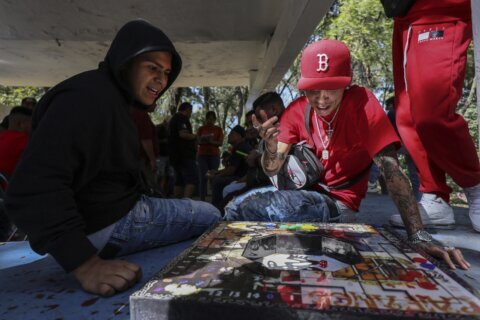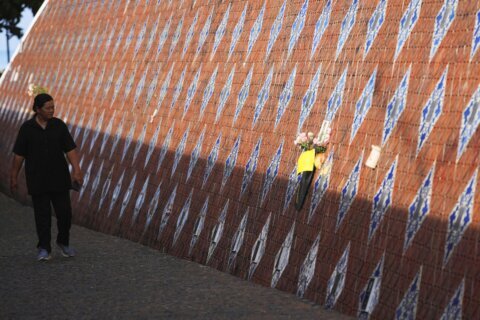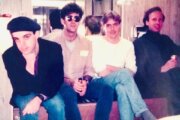AMHERST, Mass. (AP) — Since her arrest at a protest at the University of Massachusetts, Annie McGrew has been pivoting between two sets of hearings: one for the misdemeanor charges she faces in court, and another for violations of the college’s conduct code.
It has kept the graduate student from work toward finishing her dissertation in economics.
“It’s been a really rough few months for me since my arrest,” McGrew said.
Some 3,200 people were arrested this spring during a wave of pro-Palestinian tent encampments protesting the war in Gaza. While some colleges ended demonstrations by striking deals with the students, or simply waited them out, others called in police when protesters refused to leave.
Many students have already seen those charges dismissed. But the cases have yet to be resolved for hundreds of people at campuses that saw the highest number of arrests, according to an analysis of data gathered by The Associated Press and partner newsrooms.
Along with the legal limbo, those students face uncertainty in their academic careers. Some remain steadfast, saying they would have made the same decisions to protest even if they had known the consequences. Others have struggled with the aftermath of the arrests, harboring doubts about whether to stay enrolled in college at all.
In St. Louis, Valencia Alvarez is waiting to hear what will come of the potential charges she and 99 others could face for a protest April 27 that lasted less than half a day at Washington University.
Twenty-three of those arrested were students. In June, the university gave them two options: They could face a hearing with the Office of Student Conduct, or they could “accept responsibility” and forgo further investigation. Alvarez took the first option.
“I don’t really plan on being quiet about this, and I think that’s the goal of the second option,” Alvarez said.
The demonstrations swept public and private universities, on campuses large and small, urban and rural. As students return this fall, colleges are bracing for more protests against both Israel’s military and Hamas, and strategizing over tactics including when to call in law enforcement — decisions that have had lasting reverberations.
Some college leaders said calling police was the only option to end protests that stood in the way of commencement ceremonies, disrupted campus life and included instances of antisemitic signs and language.
Student groups and some faculty members have blasted college leaders for inviting police inside their gates. In their view, the police actions often trampled peaceful demonstrations with unnecessary levels of force.
The vast majority of the cases against the demonstrators — ranging from students and faculty to people without any ties to the colleges — involve misdemeanors or lower-level charges.
Prosecutors in several cities are still evaluating whether to pursue charges. But in many cases, officials have indicated they do not intend to pursue low-level violations, according to AP’s review of data on campuses with at least 100 arrests.
In upstate New York, the Ulster County district attorney asked judges to dismiss 129 cases stemming from arrests at the State University of New York at New Paltz.
“I have concluded that it is best to dismiss these charges now and relieve all concerned and the courts of any further burdens, expenses, and expenditures of scarce public and judicial resources,” District Attorney Emmanuel Nneji wrote in June.
New Paltz students said they were sitting with their arms interlocked when officers hauled them away on May 2.
“It was handled very brutally,” said Maddison Tirado, a student whose trespassing charge has been dismissed.
Tensions have run high on college campuses since the war began Oct. 7 with an assault by Hamas militants in southern Israel that killed 1,200 people, most of them civilians, and took about 250 hostages. Israel’s offensive has killed more than 39,000 Palestinians, according to local health authorities.
For some students, the impact on their academic careers has affected them more than any legal jeopardy.
At Washington University, conduct hearings for arrested students began recently but have yet to result in disciplinary decisions. In the meantime, Alvarez does not have the master’s degree in public health she would have received by now if not for her arrest.
Alvarez said she doesn’t have regrets. But that’s not to say the protest didn’t come at a cost.
“I want that degree,” Alvarez said. “I worked four jobs throughout my two years at Wash U to be able to afford tuition without pulling out any loans.”
At Emerson College in Boston, 118 people were arrested when police were asked to enforce a city ordinance against camping on public property. All will be eligible to have their charges dropped in exchange for community service, prosecutors said.
Owen Buxton, an Emerson student, said he suffered a concussion when police shoved him into a bronze statue. The experience made it hard for him to concentrate or participate in classes.
“It stifled all my creativity — I didn’t make anything for months, which is not typical of me,” said Buxton, a filmmaker.
A spokesperson for the Boston Police Department said anybody with concerns can file complaints with the internal affairs office. The department previously said there were no injuries during the Emerson arrests.
___
The Associated Press’ education coverage receives financial support from multiple private foundations. AP is solely responsible for all content. Find AP’s standards for working with philanthropies, a list of supporters and funded coverage areas at AP.org.
___
Associated Press writers Jake Offenhartz in New York, Michael Hill in Albany, N.Y., and Michael Melia in Hartford, Conn., contributed to this report.
Copyright © 2024 The Associated Press. All rights reserved. This material may not be published, broadcast, written or redistributed.







